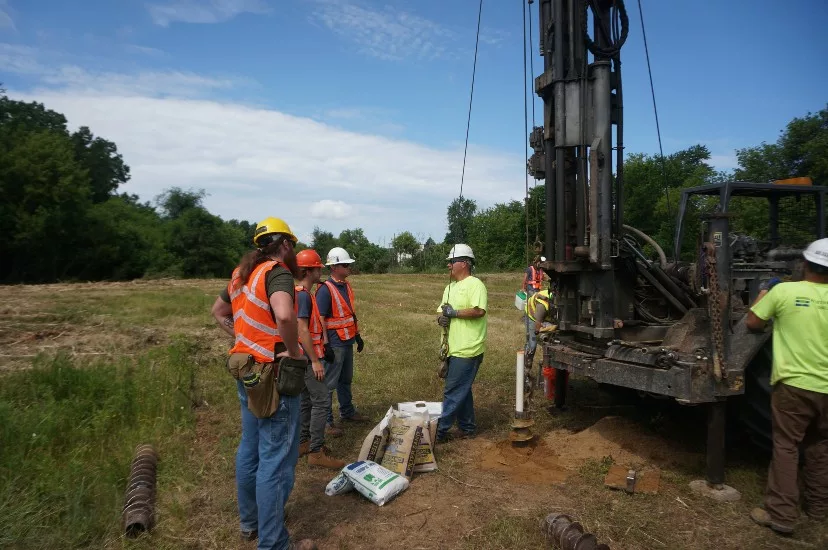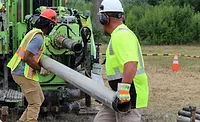3 Ways to Grow Your Drilling Career
It Boils Down to Education, Connection and Hands-On Experience

Western Michigan University’s Hydrogeology Field Course offers a summer intensive for students. Other options like Ontario’s Fleming College require a longer-term commitment.
Source: Brock Yordy
The drilling industry offers opportunities for career growth and advancement, but sometimes it isn’t clear how to achieve them. Luckily, existing resources can help. Whether you’re considering taking your first drilling job or are several steps into your career, this article will help you identify ways you can grow professionally in this industry.
Education & Training
Driller and driller assistant roles do not require a formal education or a degree, but they can certainly help you grow your career in the industry. Several institutions in the United States and Canada offer drilling education programs. If you’ve been in the industry for a while, a full-time educational program may not be the best move. However, if you’re new to the industry, a formal drilling education can give you a head start and help you stand out among job seekers.
Here are a few options to consider:
- In the Resources Drilling program at Fleming College, students are taught “foundational theory, techniques and methods relating to all types of drilling, with an emphasis on safe working practices, while learning to operate a full range of drilling equipment hands-on.” The program prepares graduates for successful careers in construction drilling, geotechnical or environmental drilling, water well drilling, resources drilling or horizontal directional drilling.
- The Water Well Driller program at Red Deer College teaches concepts surrounding the operation of mobile rotary, boring or cable tool drilling rigs used to drill residential, commercial and industrial water wells.
- The Well Construction Technology program at Southwest Mississippi Community College “provides classroom and laboratory instruction in the use of rotary drilling and related equipment used in drilling for water, petroleum, and environmental or geotechnical operations.” A significant perk of this program is that Well Drilling Operations Technicians may apply for their Mississippi Water Well Contractor’s License after completing the program and one year of field experience.
- A Midwest option is the Hydrogeology Field Course offered at Western Michigan University, which provides foundational knowledge to students on “aquifer testing, environmental surface geophysics, groundwater sampling and monitoring HAZWOPER training, remediation and well drilling and installation.” The program is hands-on and one of the few hydrogeology programs offered in the United States.
If financial or time constraints prevent you from taking a course or getting a formal credential, you can still be proactive by researching and studying up on drilling techniques online.
Online options can provide more flexibility for more seasoned students and for those who cannot attend a more traditional program. The International School of Well Drilling (ISWD) offers online courses, and is approved by 27 states as a source of renewing drilling license requirements. According to the ISWD website, the school’s purpose is to offer continuing education credits to those in the water well, environmental and geotechnical sectors of the drilling industry.
Self-study and research is another excellent way to advance your career. If financial or time constraints prevent you from taking a course or getting a formal credential, you can still be proactive by researching and studying up on drilling techniques online.
Professional Memberships
Memberships in professional associations can prove critical to growing your career. They offer educational and certification opportunities, as well as the chance to connect with others in the drilling industry. There are a few organizations worth considering, and one of them is the National Ground Water Association (NGWA). The NGWA is an excellent source of leadership, knowledge, and resources for those in the groundwater industry.
Another organization is the National Drilling Association (NDA). Similar to the NGWA, the NDA has a sponsored job board, hosted conferences, and online and print resources and recordings. There are also numerous professional trainings and certifications available through the NDA.
On-the-Job Experience
While education, training and certifications certainly help move your career forward, nothing can replace the value of on-the-job experience and training in the field. To make the most of your on-the-job training, keep these best practices in mind:
- Find a mentor — if you don’t already have one — with a high level of field knowledge and experience (such as a senior driller).
- Ask questions if something is unclear — unasked questions are a missed learning opportunity!
- Be observant and take mental note of what’s happening on a project site. The more familiar you become with all aspects of the project, the more you’ll learn.
- If you learn a new concept in the field, research it! Learning doesn’t stop when you clock out — take a bit of extra time when you return home to learn more about the new concept and solidify the new information.
- Ask for feedback. Career growth doesn’t happen if you don’t understand your own strengths and weaknesses, or how to improve. Be sure to talk with your supervisor frequently and request either a performance review or informal feedback every six months.
Looking for a reprint of this article?
From high-res PDFs to custom plaques, order your copy today!






